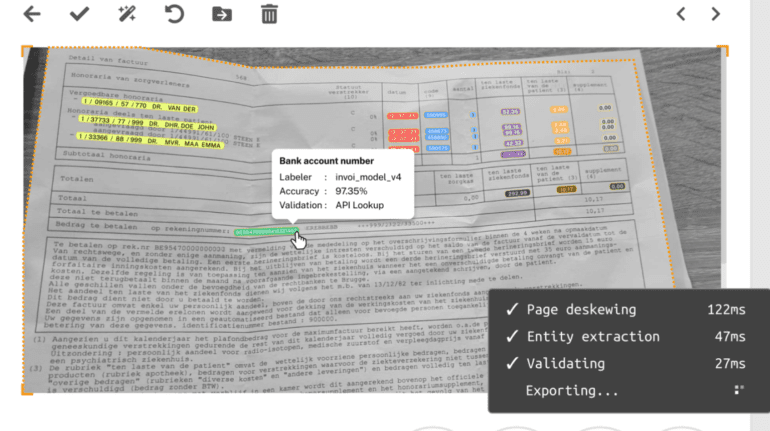TL;DR:
- Send AI, a Dutch startup, receives support from Google’s Gradient Ventures for enhancing data extraction from complex documents.
- Send AI offers a customizable platform, challenging established document processing players, enabling companies to fine-tune AI models for their specific data needs.
- The startup targets larger enterprises dealing with complex document challenges.
- Send AI competes with both traditional document processing tools and new startups using large language models (LLMs) like OpenAI’s GPT-X.
- Send AI’s approach allows customers to maintain control over their data, a key advantage in regulated industries.
- The company is in private beta mode, with plans to expand and launch commercially.
Main AI News:
In the world of enterprise data management, precision and security are paramount. A promising Dutch startup, Send AI, has set its sights on aiding companies in extracting valuable insights from vast troves of intricate documents, and it has just received a significant boost from Google’s Gradient Ventures.
Send AI is on a mission to challenge established players in the document processing arena, such as UiPath, Abbyy, Rossum, and Kofax. What sets Send AI apart is its highly customizable platform, allowing enterprises to fine-tune AI models to cater to their unique data extraction requirements.
Consider this scenario: a company operating within a heavily regulated industry like insurance often encounters a multitude of document formats, from PDFs and paper files to smartphone photos taken from various angles with distracting background elements. These non-standard, “unstructured” data types pose a significant challenge even for human operators, let alone fully automated systems. Relying solely on machines can result in erroneous claim rejections, reimbursement issues, and administrative headaches down the line.
Off-the-shelf document processing software typically caters to more common document types, crossing multiple industries, rendering them ill-suited for specific use-cases. However, Send AI empowers companies to train computer vision models to identify specific documents and separate language models to extract and validate pertinent data. Crucially, human intervention is an option when doubts arise, ensuring full control and review at each step through a user-friendly web interface.
Send AI’s founder and CEO, Thom Trentelman, explains, “This validation can be as simple as checking whether an expected number is really a number, or a more sophisticated lookup of a registration number in a database to see whether there’s a match. Any insecurities will be reported for human review.”
Originally founded as Autopilot in Amsterdam in 2021, Send AI initially secured a modest $100,000 investment from a university graduate alumni fund. However, as it gears up for expansion, the startup has successfully raised an additional €2.2 million ($2.4 million) in a pre-seed funding round, jointly led by Google’s Gradient Ventures and Keen Venture Partners. The round also attracted participation from angel investors affiliated with companies like DeepMind.
How Send AI Works
Send AI offers cloud-based software accessible to companies through APIs, streamlining the data extraction process from documents received via email. Upon receipt, Send AI optimizes the documents visually before subjecting them to language models for classification and data extraction.
Targeting the Enterprise Market
Thom Trentelman emphasizes that Send AI primarily targets larger enterprises, as they grapple the most with document-related challenges. Nevertheless, any business that handles substantial document volumes can potentially benefit from this technology.
Facing the Competition
Apart from the existing array of document processing tools available in the market, Send AI faces competition from a new wave of startups capitalizing on powerful large language models (LLMs), exemplified by OpenAI’s GPT-X. While such products excel in subjective tasks like summarization and answering questions, when it comes to high-accuracy demands across extensive document volumes, they fall short.
Trentelman clarifies, “You will hit walls with these technologies sooner than later — big, generic LLMs are still unpredictable, slow, and expensive. At Send AI, we let the customer build their own solution.”
Behind the Scenes
Send AI is built on a foundation of smaller, open-source models that customers train initially by manually processing a small dataset of documents. Subsequently, this training process repeats with human oversight for corrections when needed.
Transparent Pricing
Send AI adopts a credit-based pricing model, where customers pay per processing step. Trentelman elaborates, “This way, we can differentiate between processing a 50-page PDF or just a single-text snippet. Our models are cheap, fast, and reliable, so we can deploy them on a per-customer basis. This way, customers are in control of their data and performance, which is why we do well in regulated industries such as health insurance and government.”
Data Control
Send AI’s unique selling point lies in the control it affords customers over their data, despite being cloud-based. While traditional LLMs blend training data from multiple sources, potentially leading to data privacy issues, Send AI deploys isolated open-source transformer models for each customer.
Trentelman asserts, “We use a variety of them to get the job done — out of the box they don’t impress much, but once trained on high-quality data, they become powerful and precise.” This approach allows Send AI to pinpoint the exact location of data, enabling deletion upon request. Consequently, it positions Send AI as the preferred choice for privacy-conscious companies, challenging the notion that on-premise deployments are the only secure option.
The Road Ahead
Currently operating in private beta mode, Send AI has already secured notable clients, including insurance giant Axa. With a team of seven, the company intends to double its headcount in the upcoming year, gearing up for a full-scale commercial launch.
Conclusion:
Send AI’s partnership with Google’s Gradient Ventures signifies the growing demand for specialized document processing solutions in the enterprise market. As businesses grapple with complex documents and data security concerns, Send AI’s customizable approach and data control features position it as a competitive player in the evolving market, particularly in regulated industries. This collaboration highlights the increasing importance of tailored AI solutions for document-intensive enterprises.

